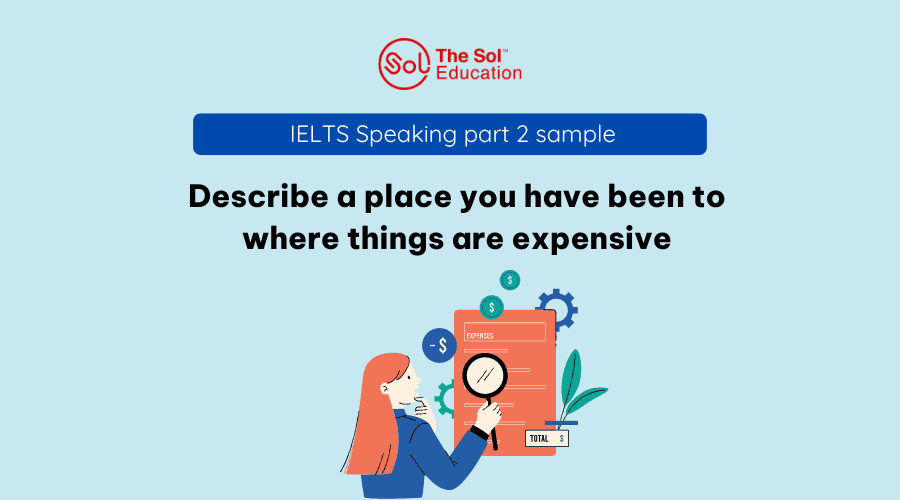Hôm nay, SOL sẽ cùng các bạn xử lý đề IELTS Speaking part 2 Describe a place you have been to where things are expensive với 2 sample mẫu, kèm những từ vựng hữu ích khi nói về topic này nhé.
Tham khảo:
Describe a place you have been to where things are expensive
You should say:
I'd like to talk about my visit to a luxurious shopping district in the heart of Singapore called Orchard Road. It's renowned worldwide for its high-end boutiques, upscale malls, and designer stores.
I had the opportunity to visit Orchard Road during a family vacation to Singapore last summer. We were eager to explore the vibrant city and indulge in some shopping, so we decided to spend an afternoon wandering around Orchard Road. As soon as we stepped foot onto Orchard Road, it was evident why things are so expensive there. The entire area exuded opulence and sophistication, with gleaming storefronts adorned with the latest fashion trends and luxury goods. From renowned fashion houses to upscale jewelry brands, Orchard Road had it all.
The prices of items in Orchard Road were notably higher compared to other shopping districts we had visited. This was primarily due to the premium quality of products offered and the prestigious reputation of the brands. Additionally, the high operating costs of maintaining storefronts in such a prime location contributed to the inflated prices.
Despite the steep prices, strolling through Orchard Road was an exhilarating experience. The bustling atmosphere, coupled with the sight of extravagant displays and immaculate storefronts, made me feel like I was stepping into a world of luxury and sophistication. However, as a budget-conscious traveler, I couldn't help but feel a twinge of unease at the thought of splurging on extravagant purchases.
So, Orchard Road is undoubtedly a glamorous destination where one can indulge in luxury shopping experiences. However, the exorbitant prices serve as a reminder of the stark disparities in wealth and highlight the importance of mindful spending.
Từ vựng IELTS hữu ích:
For me, the concept of an expensive place hits closest to home when I step into one of the upscale supermarkets or department stores in the city center. Coming from a modest background, these places always feel like a different world, one where every item comes with a premium price tag.
I remember venturing into one of these high-end supermarkets with my family during a rare outing to the city. As we strolled through the aisles, I couldn't help but notice the extravagant displays and the sleek packaging of the products. Everything seemed to scream luxury, from the imported cheeses to the organic produce neatly arranged on the shelves.
The reason why things are so expensive in these supermarkets became apparent to me as I compared prices to what I was accustomed to paying at local markets or corner stores. It's not just about the quality of the products; it's also about the branding and the experience of shopping in a prestigious environment. The convenience of finding everything under one roof and the assurance of top-notch quality come at a premium, and I realized that I was paying for more than just groceries.
As someone who values practicality and frugality, I couldn't help but feel a sense of discomfort at the thought of splurging on items that I could easily find for a fraction of the price elsewhere. While I appreciate the allure of luxury shopping destinations, I also recognize the importance of being mindful of my spending and prioritizing value over extravagance.
Upscale /ˈʌpˌskeɪl/ (Adj.): cao cấp, đẳng cấp.
Department stores /dɪˈpɑːrtmənt stɔːrz/ (N. phr.): cửa hàng bách hóa lớn.
Modest /ˈmɒdɪst/ (Adj.): khiêm tốn, giản dị.
Premium price tag /ˈpriːmiəm praɪs tæɡ/ (N. phr.): giá cao, giá cao cấp.
Extravagant /ɪkˈstrævəɡənt/ (Adj.): xa hoa, phung phí.
Sleek packaging /sliːk ˈpækɪdʒɪŋ/ (N. phr.): bao bì mịn màng, gọn gàng.
Branding /ˈbrændɪŋ/ (N.): việc xây dựng thương hiệu.
Prestigious /prɛˈstɪdʒəs/ (Adj.): có uy tín, danh tiếng.
Assurance /əˈʃʊərəns/ (N.): sự đảm bảo, sự chắc chắn.
Top-notch /ˌtɒpˈnɒtʃ/ (Adj.): xuất sắc, hàng đầu.
Frugality /fruːˈɡæləti/ (N.): tính tiết kiệm, tính tiết thể.
Discomfort /dɪsˈkʌmfət/ (N.): sự không thoải mái, sự bất tiện.
Splurging /splɜːrdʒɪŋ/ (V.): tiêu xài hoặc chi tiêu một cách hoang phí hoặc lãng phí.
Allure /əˈljʊər/ (N.): sự quyến rũ, sự hấp dẫn.
Extravagance /ɪkˈstrævəɡəns/ (N.): sự xa hoa, sự phung phí.

Well, there are several reasons why some people still prefer using cash. Firstly, it's a matter of habit and comfort. Older generations, in particular, are more accustomed to using cash for transactions. They might find it more tangible and easier to manage. Secondly, cash is universally accepted and doesn’t depend on technology, which can be unreliable or unavailable in some areas. Additionally, using cash can help people better control their spending as they can physically see the money leaving their hands, which isn't always the case with digital payments.
I believe that payments will likely become predominantly paperless in the future. With the rapid advancement of technology and the increasing convenience of digital payment methods, more and more people are adopting these new ways of paying. Mobile wallets, online banking, and even cryptocurrencies are becoming mainstream. However, while the majority of transactions might become digital, I think cash will still exist for certain situations and populations who prefer it or have limited access to digital alternatives.
I completely agree with the view that time is as important as money. Time is a finite resource that we can't get back once it's spent, whereas money can be earned and saved. Many people measure success not just by their financial wealth but also by how much time they can spend doing what they love, whether it’s pursuing hobbies, spending time with family, or traveling. In a way, having time can enhance our quality of life more significantly than having a lot of money.
This really depends on individual priorities and life circumstances. For some people, especially those with financial commitments like supporting a family or paying off debts, a high salary might be more important. On the other hand, having more time off can lead to better work-life balance, reduced stress, and overall well-being. Personally, I think it’s about finding a balance that works for each person. A job that offers a reasonable salary while also providing sufficient time for personal life can be ideal.
Having a variety of payment options is very important in today’s world. It provides flexibility and convenience for consumers, allowing them to choose the method that best suits their needs and preferences. For instance, some people might prefer using credit cards for rewards points, while others might opt for mobile payments for their speed and ease. Additionally, having multiple payment options can enhance financial inclusion by accommodating different economic and technological backgrounds, ensuring that everyone has access to financial services.
There are several factors that contribute to the variation in prices across different places. Firstly, the cost of living, including factors like housing, utilities, and transportation, can significantly impact prices. Cities with higher costs of living tend to have more expensive goods and services. Secondly, local taxes and import duties can also affect prices. In some regions, higher taxes lead to increased costs for consumers. Additionally, supply and demand dynamics play a crucial role. Areas with higher demand for certain goods may see higher prices, while competition can drive prices down in other areas. Lastly, economic conditions and currency values can influence how expensive things are in different parts of the world.
Bên cạnh yếu tố từ vựng, nội dung thì việc đảm bảo các tiêu chí về phát âm, độ trôi chảy rất quan trọng trong phần thi IELTS Speaking. Hãy luyện tập thật nhiều để có thể thể hiện một cách tốt nhất, giúp bạn đạt aim IELTS nhé.
